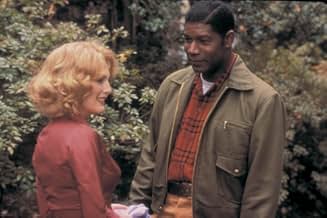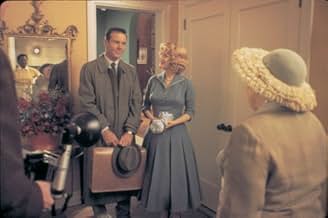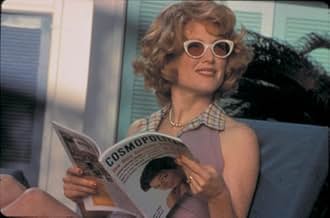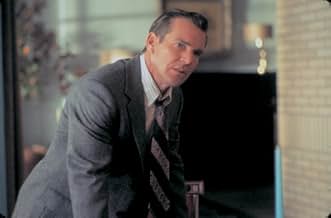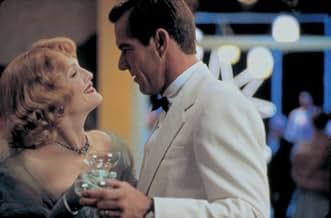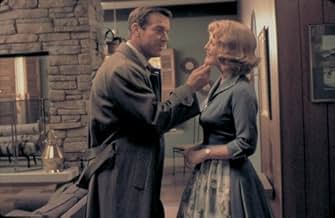En la década de los 50, Connecticut, una ama de casa lidia con una crisis matrimonial y crecientes tensiones raciales en el mundo exterior.En la década de los 50, Connecticut, una ama de casa lidia con una crisis matrimonial y crecientes tensiones raciales en el mundo exterior.En la década de los 50, Connecticut, una ama de casa lidia con una crisis matrimonial y crecientes tensiones raciales en el mundo exterior.
- Nominado para 4 premios Óscar
- 102 premios y 96 nominaciones en total
- Sarah Deagan
- (as Jordan Puryear)
- Billy Hutchinson
- (as Kyle Smyth)
Reseñas destacadas
It helps when writing a review of a film like this that you can throw round all the right references and draw comparison's wit the two Sirk films from which Haynes drew inspiration from. Sadly I can't do that as I haven't seen either of the works (although have seen some Sirk films), so I'll do the best I can! From the outset this film builds a plastic perfect 50's world before revealing that everything isn't as the outside world (and even those on the inside) may perceive. This works well but the film is strong because it works on several other levels past this one.
Past the fake nature of lives we are all human after all are several other broader themes that are not as clear but still important. The place of women is society is one where Frank's indiscretion appears to still let him work etc, Cathy much smaller crime sees her condemned from all around. Her relationship with Raymond shows how women held social status only as trophies in some circles and, when this role was threatened or made redundant, they had little more standing that blacks etc.
The two fallings of Frank and Cathy are parallel and it is interesting to see the two. Frank stigma that he must hide is one of sexuality while Cathy is less lucky in that her stigma is as clear to observers as the skin on Raymond's face. This is not to say that the film works as well on each of these levels, but it does work well enough on all of them. It is slow and patient and it may frustrate some audiences who will claim `nothing really happens' if a review says this then ignore it they have clearly missed the point.
The 50's feel is bang on and very well done. I'm not sure if Haynes has lifted the touches that make it feel `50's' from Sirk directly (i.e. copied) but it really works. The colours are lush and every set and costume feel like it must be straight from the 50's. It is to Haynes credit that he has done this without being camp or wistful in the way that many films set in the period can be. He plays it straight down the line.
The cast are roundly good. Moore deversedly got her nomination for this work and she is excellent. She never goes over the top but is visibly simmering throughout. Quaid is good but has a less complex character to carry, we don't get to understand what he is going through or felling is it deep guilt, lust, love etc? Haysbert in 24 is OK but plays a stiff, morally righteous man who is so `good' as to be difficult to swallow! Here it is not quite as bad but Raymond is still a ` good, wholesome' man. Haysbert does him well but again I wanted more to the character. The support cast are good and all play the plastic socialites and professionals of 1950's well.
Overall this film is very lush nothing but praise can be given to director, costumes and set designers etc. The cast are all good even if they must act with decorum and patience throughout and the emotion and drama of the story (although stilted and controlled) is still very involving. A very good film if it had been made in the 50's it would be held as a classic today.
In Julianne Moore he finds the perfect heroine. Her performance is so skilled that we don't see her at work. Though nominated, Ms. Moore was sadly overlooked at the 2003 Oscars. Apparently no one could see past Nicole Kidman's prosthetic nose in THE HOURS. (When a beautiful actress plays "ugly" she wins an award. Ms. Kidman's performance in THE HOURS is one of her best in that deeply moving film, but it hardly matches the subtlety and difficulty of Ms. Moore's work in FAR FROM HEAVEN.) With such breathtaking ease that we forget she is acting, Ms. Moore scales the grand challenge of using melodramatic dialogue that verges deliberately on camp to reveal the tenderness and desire of the naive 50's housewife who is the center of FAR FROM HEAVEN. (Watch her face in an early scene where she and the excellent Patricia Clarkson talk with their girlfriends about their respective marriages.)
Credit must be given to Haynes as well, who asks his cast to play it straight. Ms. Moore, who consistently achieves beauty and depth with each performance, brings this tender film to life. She has a fine counterpart in the handsome and Dennis Quaid who has not had such a plumb role since his early days.
Though every film should stand on its own, you should check out the milieu that Todd Haynes is working in the oeuvre of Douglas Sirk being the main source but you can also check out earlier films like DARK VICTORY and other domestic dramas.
The Whitakers are the model of a perfect '50's family. Frank is a handsome, highly successful businessman with a beautiful, well-respected wife, who divides her time between raising their two children, maintaining their lovely suburban home, and spearheading the requisite number of charities for a woman in her position. In fact, she is such an archetype of the ideal housewife that a local society paper has chosen to feature her as one of their profiles. Cathy's perfect life, however, is quickly shattered when she makes the shocking discovery that the husband she loves so dearly is a closeted homosexual, who obviously married her as a means of hiding the truth from both the world and himself. In true '50's fashion, Frank, when Cathy catches him in the act with another man, decides to seek `treatment' from a therapist, in the vain hope that he will be `cured' of his `problem.' These scenes are a jolting and stark reminder of just how far we've come from the days when this unenlightened viewpoint held sway in society. The film also deals with the issue of racism, when Cathy becomes a confidante and friend of a young black man who works as her gardener. When this relationship is noticed by the townspeople, the ugly realities of bigotry and prejudice come to the fore, proving that, even in a place like Connecticut, where no actual laws segregated blacks from whites, the attitudes of the common citizenry were no more enlightened than those that permeated the Deep South.
In a stroke of genius, Haynes has patterned his film after actual 1950's melodramas, particularly those by director Douglas Sirk, whose movies like `Imitation of Life' and `Magnificent Obsession' provided daring (for the times) studies of social issues like racism and May/December romances within the context of what were, essentially, glossy, visually palatable soap operas. Sirk's films are often honored for their ability to inject subtly subversive sentiments into popular, mainstream entertainments. `Far From Heaven' looks exactly like those films, from the color-splashed autumnal setting to the picture-perfect interiors of an upper-middle class home in suburban New England where familial and personal problems appear as out of place as `Leave it to Beaver' would seem if it were on network TV today. The astounding achievement here is that Haynes is both paying homage to and utterly destroying the period at the same time. He succeeds in immersing the audience for nearly two hours in this amazingly recreated world. We come to feel as trapped in the stifling setting as the characters themselves do. Haynes captures with emotional force the sense of helplessness these characters feel at not being able to `measure up' to the demands of their world and the utter sadness and loneliness caused by the fact that they don't even have anyone they can truly open up to and discuss their problems with, for they become instant candidates for rumor-mongering and societal rejection the moment they do. `Keeping up appearances' becomes the sole consideration in such circumstances, leading many people to lead lives of quiet desperation, hidden behind blandly conformist, upbeat exteriors. In our day and age, when people have gone to the other extreme - pouring out their every twisted idiosyncrasy on daytime TV talk shows for the benefit of a sensation-craving audience - it's important to be reminded of how much worse the alternative can be. If nothing else, `Far From Heaven' is a study of the kind of emotional and psychological damage that can be inflicted on an individual when a society encourages repression and conformity at all costs.
As Cathy, Julianne Moore gives a performance that can be called nothing less than overwhelming. She is utterly heartbreaking as a good-natured woman, totally baffled by the curves life is throwing at her, trying to maintain a façade of normalcy and happiness even though inside her psyche has been inexplicably and irrevocably torn to pieces. She wants desperately to figure out where her husband is coming from, but the distance he keeps putting between himself and her precludes any such understanding. Yet Cathy is also a paradoxical figure in that, even though she is struggling to keep her life and marriage appearing `normal' to the outside world, she is subtly undercutting that goal by challenging the status quo in her relationship with Raymond, the gardener. Her genuine revulsion at the racist attitudes she sees around her compels her to act in a way true to her own convictions. Moore does a perfect job conveying every facet of this richly detailed and complex character. It is certainly award-worthy work from one of our very finest actresses. As Frank, Dennis Quaid, in a controlled, restrained and heart-wrenching performance, captures the sadness of a man who wants desperately to live the life he's chosen but who just can no longer fight against the truth of his own nature. In a way, Cathy and Frank's situations are mirror images of one another. Both discover a `love' on the outside of societal norms, yet, because of the personal pain that that love is inflicting on the other partner in the marriage (his for another man and hers for another man, as well), the two hurting people seem unable to perceive that connection they share. These two fine performers turn what might have been just a cold exercise in style into a deeply moving and profoundly meaningful work
Technically, the film is a masterpiece on every level, from its art direction to its costume design to its cinematography. The veteran composer Elmer Bernstein has provided a richly evocative symphonic score, modeled on actual '50's style soundtracks, that brings out the melodramatic richness of the film's many set pieces. Yet, his work here also has a quieter quality, particularly in the subtle piano riff, which reminds us quite a bit of his classic score for `To Kill a Mockingbird.' As a director, Haynes shows himself in total control of his medium, blending all these elements into a complete and satisfying whole.
`Far From Heaven' is really unlike any movie you have ever seen, a fascinating admixture of the old and the modern. It also happens to be one of the very best films of 2002, a true work of art.
Yes, it is true, this man is considered "sick" but that is just one of the many skewed attitudes of the 1950's that director Todd Haynes brings to light in Far From Heaven. Julianne Moore plays Cathy Whitaker, the wife of Frank Whitaker, Dennis Quaid, who are the proud parents of two children. The live the life that people envied. A nice home, money, success, and happiness. All of that comes crashing down when Cathy discovers her husband is not who he really is.
Cathy goes to Frank's work to drop off some dinner only to discover that her husband is in the arms of another man. Frank says that he is "sick" and wants treatment. Cathy, the "super wife" is behind him 100 percent, as if he really had an illness to beat. Frnak is ashamed and doesn't want support, just some privacy while he goes through session after session of therapy to try and make him "normal".
To add to this difficulty, the family gardener passes away and his son Raymond, Dennis Haysbert, takes over. Cathy comes to confide in Raymond and find peace of mind in his attitude and his overall good nature. The neighborhood looks down on their friendship and casts a shadow on the household. Raymond, a black man, is much like Cathy, seeing not color, but people. Even in New Haven, Connecticut, the feeling of white superiority still runs through the veins of its inhabitants.
The movie from start to finish is wonderful. It is a roller-coaster of emotions. Moore, Quaid, and Haysbert give fantastic performances. Even Patricia Clarkson, who plays Cathy one true friend in the neighborhood gives a delightful performance.
It's not just the acting that gives this movie it's lift off of the ground. Haynes direction and the art direction of the film create a pallet of colors and emotions that set the mood for each seen. The film opens in autumn. The leaves are shades of red, yellow, and orange, a true autumnal foliage like you would see on a Vermont postcard. The clothing is a perfect time capsule of the 50's. Haynes also uses a lot of colored lights to directly influence the mood of a scene. The green neon light of the gay bar Frank enters gives a strange feel like an alien world. The blue light that comes in through the windows in his office at night and in their home after a party means something dramatic is taking place.
Elmer Bernstein has racked up 14 nominations for his music, including a win for Throughly Modern Millie. His score for this film is the current that pushes the story along. Like so many great composers, he doesn't create music but a character. Everything is different with the right score to back up a great story.A story and a script that Haynes wrote so beautifully. He captured the lingo that kids used in the 50's and gave us a look at how kind people can be and how despicable some are.
The issues that Haynes tackles in the film are still around today, just not taken so seriously. It is hard to think that only 50 years ago, homosexuals were looked at as sick people and the African-American community was still not welcome. To this day there are still hints of this feeling around the country, but most is left to be talked about in the privacy of our own homes.
Whether or not you are straight or gay, black or white, democrat or republican, we all are people. Haynes shows that even if two people are in harmony, it is the outside influences that can rip them apart. Hatred and tolerance cannot coexist.
¿Sabías que...?
- CuriosidadesCinematographer Edward Lachman created the 1950s "look" by using the same type of lighting equipment (incandescent), the same lighting techniques, and the same type of lens filters when shooting this film, as would have been used on a 1950s era melodrama.
- PifiasThe typewriter around the corner from Frank Whitaker's office is a late-model Selectric (circa 1971 at the earliest).
- Citas
Cathy Whitaker: That was the day I stopped believing in the wild ardor of things. Perhaps in love, as well. That kind of love. The love in books and films. The love that tells us to abandon our lives and plans, all for one brief touch of Venus. So often we fail at that kind of love. The world just seems too fragile a place for it. And of every other kind, life remains full. Perhaps it's just we who are too fragile.
- Créditos adicionalesThe first end credit reads "for Bompi"
- ConexionesFeatured in Anatomy of a Scene: Far from Heaven (2002)
Selecciones populares
- How long is Far from Heaven?Con tecnología de Alexa
Detalles
- Fecha de lanzamiento
- Países de origen
- Sitios oficiales
- Idioma
- Títulos en diferentes países
- Lluny del cel
- Localizaciones del rodaje
- Empresas productoras
- Ver más compañías en los créditos en IMDbPro
Taquilla
- Presupuesto
- 13.500.000 US$ (estimación)
- Recaudación en Estados Unidos y Canadá
- 15.901.849 US$
- Fin de semana de estreno en EE. UU. y Canadá
- 211.279 US$
- 10 nov 2002
- Recaudación en todo el mundo
- 29.027.914 US$
- Duración1 hora 47 minutos
- Color
- Mezcla de sonido
- Relación de aspecto
- 1.85 : 1
Contribuir a esta página



